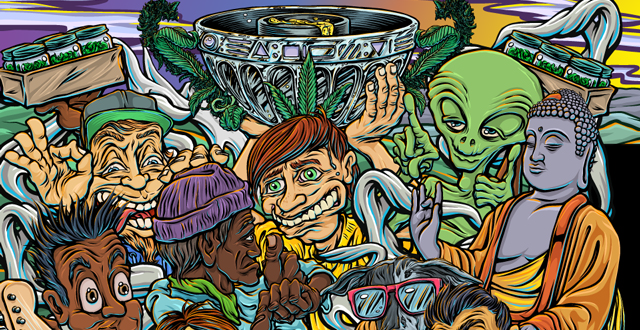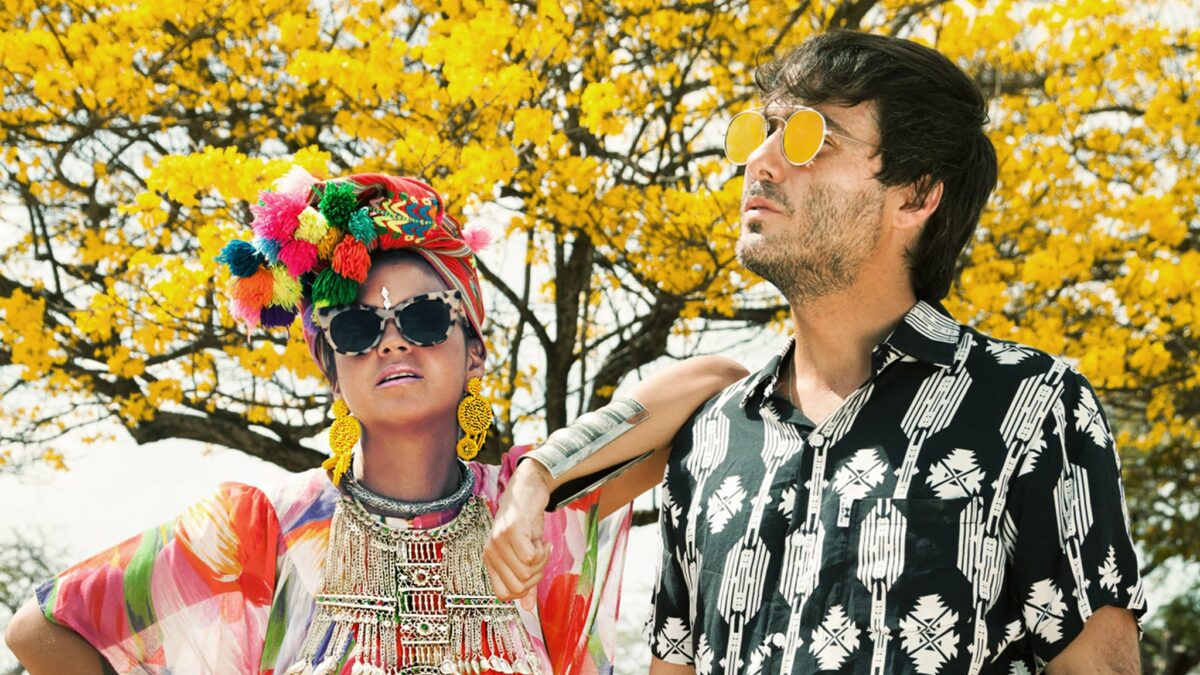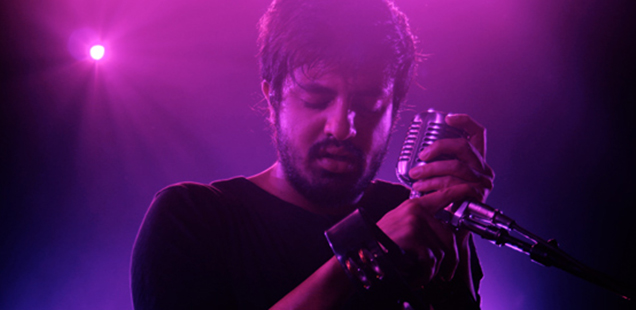Q&A with the Founder of The Emerald Cup, the Largest Cannabis Competition in America

A county fair-inspired harvest celebration is gearing up for its 13th annual event, this weekend. And the featured crop to be celebrated is unlike any others you might find at your traditional county fair or harvest hoorah. The festival is called The Emerald Cup, an event Rolling Stone likened to the Cannabis Cup in Amsterdam, which they deem the “Oscars of pot.” The Emerald Cup is a competition for cannabis growers and now draws patrons in the tens of thousands–all to come out and appreciate one of California’s most celebrated plants and enjoy some stellar music.
This year’s Emerald Cup stages will be graced by top acts like Damian Marley, Dirty Heads, Nattali Rize, Raging Fyah and Stick Figure. With the recent addition of educational workshops and speakers, Emerald Cup has joined the ranks as one of California’s most immersive festivals. And with the recent passing of Prop 64—a measure which will legalize recreational use of marijuana in the state of California—The Emerald Cup just got even more interesting.
The ‘Cup’s founder, Tim Blake, grew up like many country town kids, attending the county fair to celebrate and absorb all the sights and smells associated with a plentiful harvest. Blake speaks with a matter-of-fact charm while recalling the fruits, vegetables, animals, and all the fixin’s of a harvest fair. But he noticed the absence of one of Northern California’s most prominent crops.
“I wanted to know why we don’t have a friendly competition and celebration of our fall harvest for cannabis,” Blake told SF Station. “So I decided to go ahead and do it. It was pretty illegal back then, so we disguised it as a birthday party and invited a bunch of our friends.”
Thirteen years later, The Emerald Cup is the largest cannabis competition in America, according to Blake. The ‘Cup accepts around eight to nine hundred cannabis samples from San Diego to Eureka. Before judging takes place, each sample is tested for pesticides at SC Labs. “This is such an important part of the process,” Blake said. “There shouldn’t be pesticides on anything our families ingest, ever.” The ‘Cup also hosts talks from Brian Leahy, director of the California Department of Pesticide Regulation.
Not only is The Emerald Cup making strides to drive the industry—and hopefully big agriculture—it’s also focusing on crop cleanliness standards. The Emerald Cup team is also offering awards for best practices such as the new Regenerative Farming Award. “Cannabis producers are being held at a higher standard,” he stated. “And we should be, because we need to lead the way for this country.“ This year, The Emerald Cup has allocated over $55k to one-of-a-kind glass prizes. “This isn’t just something out of a gift shop,” Blake promised. “We’ve got the leading glass blowers of the world.”

The Emerald Cup takes place this weekend, with events on Saturday and Sunday. Stick Figure and Damian Marley cap off Saturday’s events, with Dirty Heads closing out Sunday’s festivities. However, the Emerald Cup doesn’t stop at the music and growers competition. Over the weekend, attendees will have the chance to hear more educational talks from prominent figures like Dr. Jahan Marcu, who has championed extensive research on the human benefit of cannabis, its anti-cancer properties, and the natural occurring receptors in our nervous systems, which seem to be designed to process THC. “This isn’t about making money,” Blake said. “This is about giving back to the community and having a fun celebration and educational forum.”
Tickets for The Emerald Cup are still available at $120 for the full weekend event or just $70 for a single day pass. Find tickets here and the full lineup for the weekend packed with talks, workshops, music, and more on The Emerald Cup’s website. Find the full conversation regarding Prop 64, The Emerald Cup, and industry standards with Tim Blake, below.
 Tim Blake, The Emerald Cup founder
Tim Blake, The Emerald Cup founder
How did The Emerald Cup come to be?
I grew up, like most of us, going to the county fair each year…each year enjoying the different sights and smells, the fruits, vegetables, animals, and what not. I wanted to know why we don’t have a friendly competition and celebration of our fall harvest for cannabis. So decided to go ahead and do it. It was pretty illegal back then, so we disguised it as a birthday party and invited a bunch of our friends. We had a couple dozen entries and couple hundred people show up. We didn’t get busted and we were off to the races.
I imagine—due to the legal aspect—it was pretty difficult to get any marketing out…
We couldn’t do any [marketing]. We were trying to find the first year’s poster, until we realized we didn’t even make one. We didn’t advertise at all. It was all word of mouth, a local Mendocino thing. The guy who won the cup was the father of a friend of mine. He came with a personal Purple Kush clone. This guy, an 86-year-old man, had never grown cannabis before. He grew it and won the cup! We were going to give him this beautiful ceramic [trophy]. But he said, ‘I’m 86 years old. I’m gonna be gone in a couple years. You guys ought to keep this for yourselves.’ So we still have the first year’s cup.
When did you begin to feel more comfortable with getting your name out there more?
A few years later, Rolling Stone came and ran a story on us. We ended up on the inside cover, about six pages. That was about seven years ago. That’s when it blew up. It was still in Area 101. About 5 years ago…they arrested several farmers in Mendocino and we were talking about canceling…I decided to go forward with it anyway. Until that point [The Emerald Cup] had been a party. But then all these lawyers and teachers came to stand with us. We put some panels on [the lineup] and it changed into this educational community bonding event. From then on, it became bigger each year.
I was wondering if that Rolling Stone article resulted in any negative impact. It sounds like there may have been initially. In the long run, though, it seems to have opened doors to a much-expanded, educational event.
Sometimes life works that way. They say, if the Dalai Lama hadn’t been run out of Tibet, Buddhism wouldn’t have moved all over the world. We’ve now grown out of Area 101 and Humboldt, because we got too big too quick, and so we had to move to Sonoma. It was the best thing that could have happened to us because it brought farmers and the patients together. Up [in Mendocino], The Emerald Cup was more of a grower’s party. The growers were worried that moving to Sonoma would sully it. Then they came down and realized that all those patients adored them and revered them.
How does the judging process shake out?
Well, the judges get an entry and a number. They don’t get any test results, strain info, or anything. So it’s a blind test. They judge based on 1-10 for taste smell and look. Then they judge, 1-10, on affect. That portion gets a double-score. So best possible score is a 50. Every aspect gets judged, but the effect gets a double score. So it can be a beautiful product. But it’s really got to have a nice high. They can’t just be beautiful.
These judges take this very seriously. They get together four or five times for all day sessions to go through everything. They get the total number of entries down to 350, then to 200, to 50. Then, they take home the top 50 to arrive at the top 20. Most of the people who come judge for us might be reluctant to come back because it’s so demanding over the course of a month and a half. We usually have 12 judges just for the flowers. Now, we’ve added concentrates, topicals, tinctures, and CBD to judge. So, we’ve now gotten over 50 judges involved. We’ve got the Best Breeder Award for the best geneticist. We’ve got the Regenerative Farming Award. We’ve added the Lifetime Achievement Award.
When did you begin testing your entries for pesticides?
We started testing last year. This is all so new. [When we started] the industry didn’t have these standards yet. Now, there are testing kits that if anything ever touched a pesticide, they can tell. They couldn’t do that a few years ago.
Did many samples test positive for pesticides last year?
It was a little disappointing to learn that 5% of the entries failed. We did have 20 out of 400 [test positive for pesticides]. Some of these people may have unknowingly received clones from somebody who had previously used pesticides. We were going to release names of entries who failed but…we realized there had probably been a lot of innocent participation in that. So, everyone got a pass last year and we’ve learned from it. This year everyone has to be responsible about where they get their [material], their clones, their fertilizers, their nutrients. We’re going to post results this year. Cannabis producers are being held at a higher standard.
And do you reward the producers who display best practices?
We’re giving a Regenerative Farming Award this year. We’re also bringing a lot of educators in to talk about regenerative farming and living soil this year. Just like with the rest of the world, the American agriculture industry takes all of our top soil. From the east coast to California, it’s essentially gone. There’s not enough regenerative farming…all the nutrients are going away. We’re not going to be able to sustain ourselves like this. So we started this new award to honor regenerative farming. We’re trying to teach people about pesticides and we’re also teaching people to grow clean cannabis so they don’t need to use pesticides.
What does the pesticide testing process look like?
We’ve brought up the standard of entries with SC Labs. Testing is a challenging process across the board. We have to pick up entries from around the state, then bring them back up to Area 101. We break them down into samples for the judges and also for the testing labs. The pesticide tests take five days. Then, it takes a considerable period of time just to get those samples to the judges. We’re doing weekly meetings at SC Labs just to accommodate all this. To test 800+ samples, and do so while giving the judges enough time to do their jobs, it’s quite a challenge…But this is such an important part of the process. We’re not going to give [our judges] cancer causing materials to judge.
Did you say you have 800 entries?
Last year we had close to 800 entries. We were at about 900 the year before. Who knows the way it will go this year. It’s the largest cannabis competition in the world for outdoor organic.
How far do your entries travel to be a part of your competition?
We have people from all over the state, from San Diego all the way up to Crescent City. We get them from Tahoe, Eureka, all over!
Do you have any plans to expand your reach to accept out-of-state entries?
That’s interesting. I do see that taking place in the future. But it may be that we go to other states and hold competitions there. It may be that we do competitions in other states, then put all the winners together and have a separate competition. It’s very interesting. We partner with the producers of Ineffable Live. They would like to do other shows with us. So we’re in the process of finding other locations to do so.
What are your thoughts on the passing of Prop 64?
I came out early for it. I got a lot of grief over that from a lot of farmers. A lot of farmers up here are very fearful of their future…rightfully so. They’ve had a really good ride. Now with legalization and regulation, that’s gonna go away—just like with alcohol. I understand that, and I fear for them…and myself. At the same time, having been arrested myself and having friends who’ve done long stints in jail…as long as they were going to be arresting people and putting them away for long periods of time…as long as patients didn’t have easy, safe access to medicine…and as long as they were going to restrict the California markets…I couldn’t say I was against 64, in a selfish way, to say it was better for business. If we hadn’t gone for 64, it would have set us all back years. Now with California going legal, that’s gonna draw all that business to us. You know, the guy from Japan, Europe, or the east coast doesn’t want to go get bud and do the tourist thing in Colorado. He wants to come here and see the Golden Gate Bridge and wine country.
Are you fearful of big money and big corporations sticking their own hands in this?
That’s already here. People worry about big corporations. Four and eight-acre farms have already been approved in Humboldt. We have 1-acre farms springing up all over the state. The average farm in Mendocino is less than a quarter acre or even an eighth of an acre. Our farmers will now be competing against people with a full acre and four to five hundred plants, while that average farmer has just 50. When you talk about big corporations and big companies…well, there’s three Marley brands. Those are going to be big companies. Willie Nelson has a brand. Tommy Chong has a brand. Those are big companies small farmers are already competing against. And these aren’t adversaries, these are our heroes. But the average farmer is already trying to gain market share from those people.
What would you say to consumers to help them navigate their choices going forward?
When you’re looking to market, there are a number of companies coming out—like Cannabis Conservancy and Clean Green. [Farmers] have to get certified. The idea behind our contest and our Regenerative Farming Award is farmers will have to be certified with best practices. If you’ve got that seal on your product, people are going to know that it’s clean. It’s going to be very easily identifiable. I think that consumers are going to have a plethora of cost effective cannabis. The prices are going to come plummeting down. It’s not going to be great for the farmers. But for the patients, it’s going to be wonderful. Shouldn’t that be the way it is? Shouldn’t consumers [and patients] have the widest variety of wonderful all organic choices?
What does 64 mean for the future of Emerald Cup?
It will be totally open. I have had to turn down so many requests from out of this country, from other parts of this country for the [designated medicating] areas. Well, next year they will be able to walk freely through the whole event without licenses. So, we’re going to have an amazing event. I can’t imagine how big it will be. I imagine cannabis will be incorporated in all major California events now…Outside Lands, etc. In some ways, it could take away from how special The ‘Cup is. But in so many ways it will enhance it. But I never worry about the personal fallout, because if it’s good for society, it’s good for all of us.

Are there any layout changes to this year’s event?
Oh yeah, we’ve added on another forty 215 booths, another tent…they built another building on the grounds which we’re renaming [for the event] and hosting music in. We’ve actually expanded nearly as much as we can, with another 50 vendors and another 12 food vendors. We’re going out of our way to give an experience people will never forget.
Do you see yourself outgrowing your new home in Santa Rosa?
We may have already outgrown it…we just like it so much. It’s so quaint and comfortable and the law enforcement are very mellow with us. The community loves us and there’s easy access to hotels. We’ve never had a DUI. We don’t want to go to a place that’s much larger and doesn’t give this same experience. It’s not about how many tickets we sell. It’s about the experience. We have all organic food. We give things away. We go to the Salvation Army every year and buy about 70 couches for seating at The ‘Cup.
Will people be able to get their California Physician’s Recommendation Card onsite?
Oh yeah. We have doctors to help get that done hopefully within 10 minutes.
Have you been approached by anyone in government positions to help shape industry regulation going forward?
Sure. I’ve spoken with Gavin Newsom—California’s Lieutenant Governor—when he came up to Humboldt for a Blue Ribbon Commission. We also spend a good amount of time with Congressman Jared Huffman. All these people are very interested, as they are involved in state law. Hezekiah Allen, who will be at this weekend’s event, has been working on legislation for the last two years. What’s happening with these congressman is they come hang with us and realize we’re no different than they are. We want clean water for our kids, we want to work, we want our roads fixed and we’re willing to pay taxes. We want strong community. It’s an educational process which we need to work together on to live in peace and harmony.
What is your preferred method of cannabis use?
I use all vaporizers now. I have respiratory distress from fifty years of smoking joints. So I do primarily vapes, they help let your lungs heal and it’s a more pure way to take in the cannabis. I went to the doctor a few years ago and I was at 22% [lung function]. They wanted to put me on a tank and said my lungs may not come back. Six months later, after switching to vaporizers, I was back at 70%. The doctors said they’d never seen anything like it.





